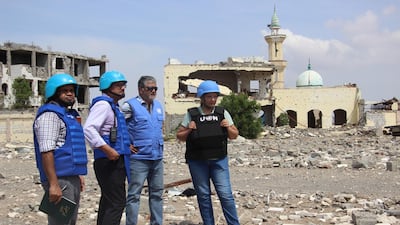Yemen's government has suspended its participation in the UN-led committee overseeing a fragile ceasefire in the port city of Hodeidah in response to attacks by the Houthi rebels.
The decision, announced on the state Saba news agency, came hours a Houthi sniper shot a government observer at a ceasefire monitoring post on Wednesday, a spokesman for pro-government forces said.
"The rebels shot Col Mohammed Al Soleihi, one of our liaison officers who have been taking part in the UN monitoring posts in and around the city of Hodeidah since October 2019," Col Wathah Al Dubaish told The National.
He said the officer was shot in the head while on duty at a monitoring post on Sanaa Street in the east of Hodeidah. "He was badly injured and transferred to a hospital in Aden for treatment," Col Al Dubaish said.
“We ordered all the pro-government liaison officers to withdraw from all the monitoring posts in and around the city until a further notice."
Five monitoring posts manned by government and rebel representatives were set up in October last year to help reinforce the ceasefire brokered by the United Nations at talks in Stockholm in December 2018.
The truce was aimed at ensuring the uninterrupted operation of Hodeidah's ports, which receive the bulk of food and aid shipped into Yemen.
But in another sign that the ceasefire was under strain, a Foreign Ministry statement released on Wednesday said the government has suspended its participation in the UN-led Redeployment and Co-ordination Committee, tasked with implementing the truce, because of continuing escalation by Houthis.
The ministry said the Iran-backed rebels were using the ceasefire agreement to mobilise forces and launch more attacks.
The UN special envoy for Yemen Martin Griffiths warned on Thursday that Yemen could see a flare-up in fighting because of recent rebel escalations, particularly in the northern province of Jawf.
“The parties will either move Yemen toward a de-escalation and resumption of the political process or toward greater violence and suffering that will make the path to the negotiating table more arduous,” Mr Griffiths told the Security Council.
The Houthis ousted President Abdrabu Mansur Hadi’s government in Sanaa after taking over the capital towards the end of 2014, prompting military intervention in March 2015 by a coalition led by Saudi Arabia and the UAE. The conflict has left more than 24 million Yemenis dependent on aid to survive.

